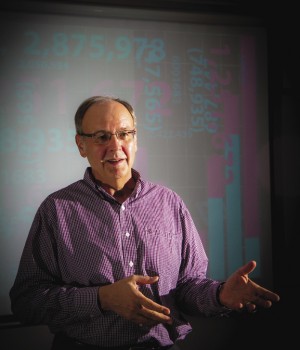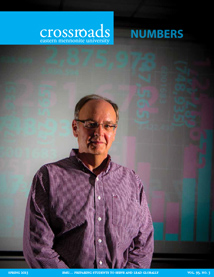
Ronald L. Stoltzfus ’75
If you want to understand the passion of Ronald L. Stoltzfus for accounting – notably getting the numbers right, providing complete and transparent information, and putting the public good first – you need only look as far as the accountant he respects the most in the national arena: Lynn E. Turner.
As chief accountant for the U.S. Securities and Exchange Commission (SEC) from 1998 to 2001, Turner was a leading advocate of auditor independence rules and international accounting and auditing standards.
“He’s one of my heroes,” says Stoltzfus, who heads EMU’s accounting program in the business and economics department. “He understands that accounting information helps investors, creditors and other users make good decisions. This is why accurate, transparent financial information is a ‘public good.’”
Stoltzfus admires the way Turner speaks to accounting conventions, “asking the hard questions that need to be asked,“ says Stoltzfus. Turner, for example, has publicly questioned why the investigative budget of the SEC was drastically cut in 2007, hamstringing an agency responsible for enforcing the laws regulating the nation’s banks. (This was at a period when JPMorgan Chase, Citicorp, and Bank of America were implicated in the global financial meltdown.)
Unlike Turner, Stoltzfus is not famous – at least not beyond certain university circles – but he shares Turner’s moral outrage at financial reporting practices that harm the public good.
This is why Stoltzfus is spending his 2012-13 sabbatical examining the way state governments report on the pension benefits they have promised to their employees. “Most state pension plans were fully funded seven years ago,” he says. “Now they aren’t.”
“Instead of following the recommendations of actuaries, many state legislatures have reduced the percentage of funds set aside for the pensions.”
In Pennsylvania, for example, Stoltzfus found that the state workers’ pension fund was underfunded by $14.7 billion as of 2011, partly the result of 10 years of sub-par investment returns and partly as a result of the state legislature cutting the set-aside money from 26% to 11% of payroll. (Stoltzfus cites “State Employees Retirement System, Comprehensive Annual Financial Report,” 06/30/11, p.72.)
Unfortunately, many states report similar patterns, he says: “Why are they [the legislatures] messing with the pension funds? Is this a short-sighted effort to balance the state budget at the expense of state workers?”
Stoltzfus hopes to publish his findings as soon as he wraps up his research. This is not a dry academic exercise; underfunded pensions funds will impact tens of thousands of public employees in the state of Pennsylvania alone.
For Stoltzfus, accounting is a high calling – right up there with being a skilled physician or a wise pastor. “To run a business, non-profit or a government agency, you must have properly trained people who know how to collect the right data and present it understandably, giving accurate answers to a host of questions.”
“Good CPAs [Certified Public Accountants] are problem-solvers for their clients,” he enthuses. “And auditors are like forensic investigators – they have to be very bright and very astute. Behind every major business reporting failure, there was an audit failure.”
Stoltzfus says a flaw in the U.S. audit system is the fact that the auditor is paid by the company being audited. He points to the way Arthur Andersen – one of the “Big Five” accounting firms until 2002 – was getting a million dollars a week from Enron at time when it was fraudulently reporting its financial position, deluding its investors. (Enron filed for bankruptcy in 2001.)
In addition to being a CPA and an EMU alum, Stoltzfus holds a PhD in accounting from Virginia Commonwealth University, a master’s in accounting from James Madison University, and a master of business administration from Shippensburg University.
“Its very unusual for a university this size to have somebody with a PhD teaching accounting, “ says Spencer Cowles, PhD, chair of EMU’s business and economics department. “It’s also unusual to find someone with a CPA and a PhD in accounting who also has an MBA. Ron doesn’t just have a narrow technical perspective – he understands how accounting fits into business.”
PhD-holding scholars of accounting like Stoltzfus are in short supply nationally, according to the American Accounting Association. This may explain the salaries they can command on the academic market. New hires as full professors of accounting received a mean salary of $169,200 in 2009, according to a 2009-2010 salary survey conducted by the Association to Advance Collegiate Schools of Business.
“The highest salary you can get as an accounting professor at EMU is probably half what you could get at a major university with a full-fledged graduate program in accounting,” says Cowles. Yet Stoltzfus, long-time treasurer of his Park View Mennonite Church, has stayed put at EMU since arriving here in 1984, after a decade of being a controller in the private sector. His motivations clearly are beyond money.
“I believe in the mission of EMU. I think we make a difference in young people’s lives,” he says. No accounting student “gets lost here…. I know if you aren’t prepared and if you’re not in class.”
The exams that Stoltzfus puts his students through are intended to prepare them for the multi-day exam marathons that they will need to endure to pass their CPA exams. In short, EMU’s accounting exams are really tough. But, as dozens of accounting graduates have told Crossroads, the pay-off is success in graduate school and in getting the coveted CPA license with relative ease.
Stoltzfus also stays put because “I have great colleagues. Our department really values teaching in a liberal arts context where clear thinking and clear writing are very important,” he says. “And so are relationships and understanding the broader context of business and society. It’s not just about accounting.” — Bonnie Price Lofton, MA ’04
